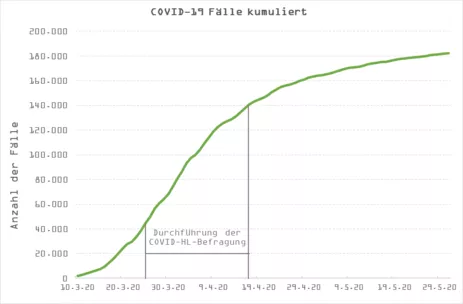At the early stages of the Covid-19 pandemic in Spring 2020, the first global survey of the Covid-HL Network was launched, researching university students' digital health literacy in the context of health-related information about coronavirus and COVID-19. During the survey, confirmed Covid-19 cases were increasing rapidly in the German population (see Fig. 1). All German universities were contacted (N=390) and N=14,895 students from 130 universities across the country completed the online survey between March 25 and April 17 2020. Ethics approval was obtained by Bielefeld University (EUB 2020-053).
The data set was weighted according to gender and intended degree (bachelor's, master's, other [e.g. doctorate]) on the basis of available data from the German Federal Statistics Office. Accordingly, the gender distribution is comparable to the nationwide data (male: 51.5%, female: 48.5%). The largest proportion of respondents is in the 21-23 age group (37%), followed by the 24-26 age group with 24% and the 27+ age group with 21%. Looking at study subject, engineering students predominate at 23%, as do those in the social sciences, psychology and education at 20%. In the global survey, approximately 100,000 students from more than 40 countries worldwide completetd the surveyed.
Digital health literacy
Health literacy is understood as the ability to deal with health-related information. In particular, it includes finding, understanding, assessing and using information on health topics in order to make decisions for health promotion, disease prevention and health care in everyday life. Digital health literacy is based on this understanding and focuses on dealing with health-related information via digital communication technologies and media such as the Internet, social media and apps. Digital health literacy is particularly relevant in the current pandemic in order to understand the large amount of online information available and appraise the quality and relevance of information in order to apply it to make decisions about health. Managing information is much more difficult these days because of the digital realm, which can be characterized as being murch more dynamic in terms of complexity and availability of health information, including in print, audio, and visual media.
Infodemic - an information overload
Another phenomenon that occurred simultaniously to the Covid-19 pandemic is the so-called infodemic (short for "information epidemic"). The infodemic first appeared in 2003 during the SARS outbreak and describes the rapid spread of information via the Internet and other digital and analog communication channels. In the infodemic, facts and trustworthy information are mixed with a flood of dis- and misinformation, false reports, untrue statements, misconceptions, myths, dangerous half-knowledge, fake news and conspiracy theories. This flood of information makes it difficult for users to filter the correct and situation-relevant information and can also be overwhelming.
Prior to this study, not much was known about the (digital) health literacy of university students, especially in relation to crisis with societal impact such as the Covid-19 pandemic. Therefore, the Covid-HL: Universities study explores how students are coping with the challenges of this pandemic and how they are coping with the changes to ther life and study. The greater interest is learning more about their health literacy, but aspects such as information behavior as applied on the Internet and social media, their health resources, attitudes, concerns, and future time perspective as well as their physical and mental health were also looked into.
Project objectives
The main goals of the COVID-HL: Universities Survey are to:
- Assess digital health literacy of university students during the COVID-19 pandemic
- Explore the different digital sources of information students consult when seeking for COVID-19 information and identify their preferred choices
- Capture students future time perspective/worries and there relation with student`s digital health literacy, information seeking behaviour and health situation
- Asess students Sense of Coherence and its association with student`s digital health literacy, information seeking behaviour and health situation
Detailed information is available on the website of the Covid-HL: Universities project.
Selected publications
Peer-reviewed
Reports
Documentation
KonsortSWD Database of Covid-19 research: COVID-19 Health Literacy University Survey (COVID-HL: University)
Press and media
Studierende erleben Probleme mit Gesundheitshinweisen zu Corona
Digitale Gesundheitskompetenz von Studierenden während der Pandemie
Digitale Gesundheitskompetenz von Studierenden in Deutschland während der Corona-Pandemie
Gesundheitskompetenz: So suchen Studenten Corona-Infos
Die Pandemie hat die Bedeutung von Gesundheitskompetenz deutlich gesteigert

